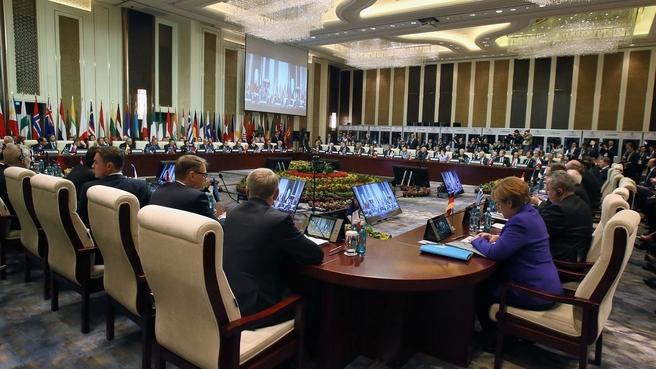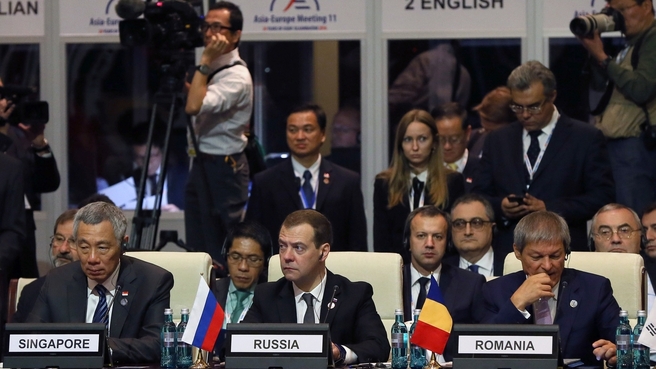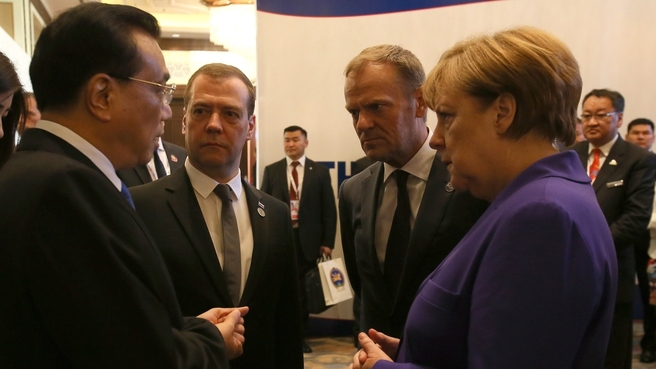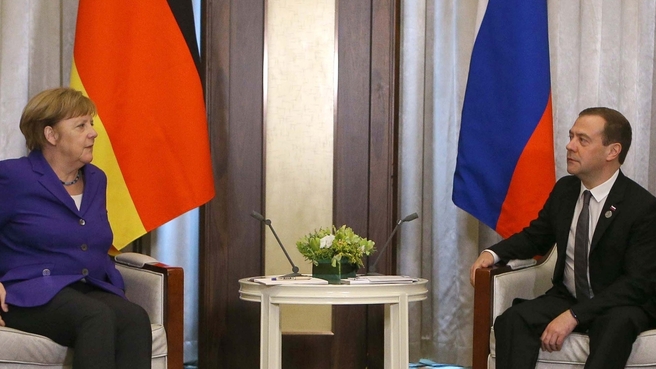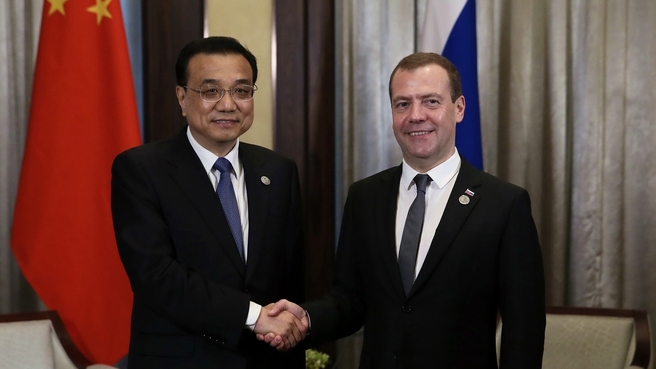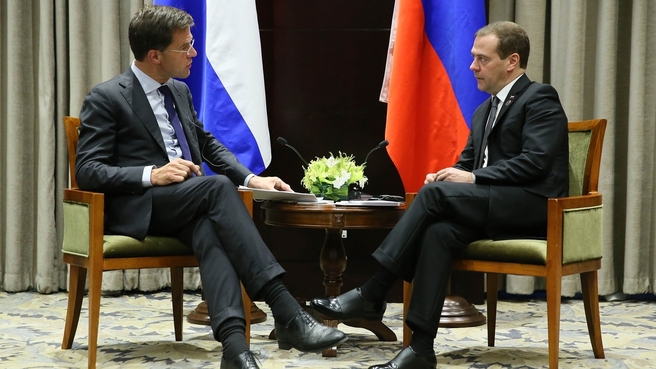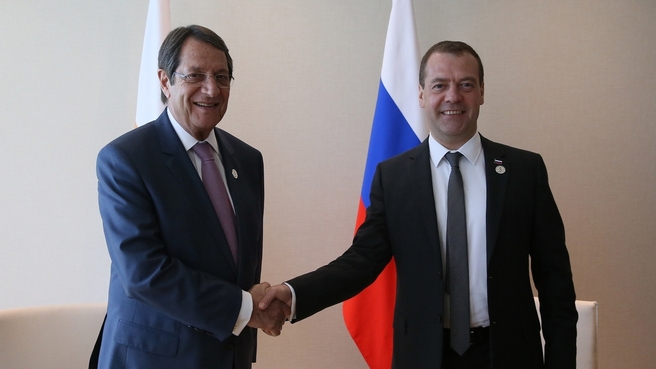Dmitry Medvedev has spoken at the plenary session of the ASEM Summit, “Promoting ASEM partnership for greater connectivity”.
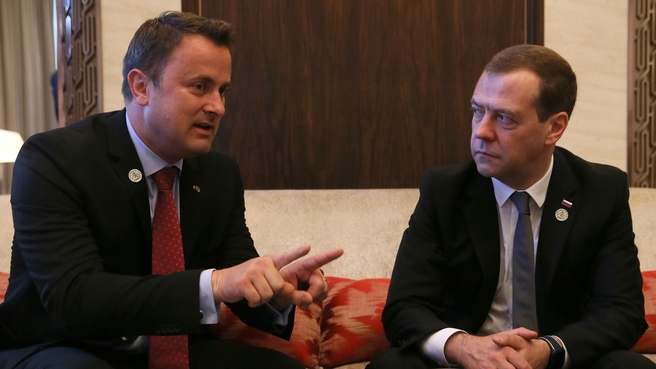
Dmitry Medvedev’s conversation with the Prime Minister of the Grand Duchy of Luxembourg Xavier Bettel
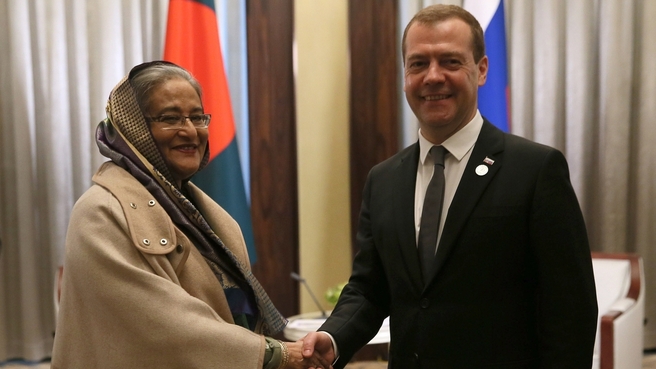
Dmitry Medvedev’s conversation with the Prime Minister of the People's Republic of Bangladesh Sheikh Hasina
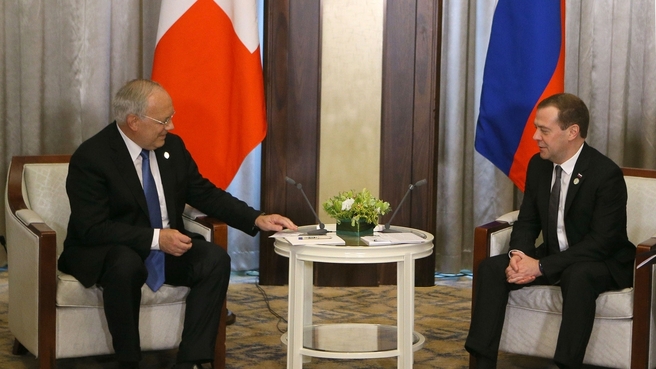
Dmitry Medvedev’s conversation with the President of the Swiss Confederation Johann Schneider-Ammann
11th ASEM Summit
The Asia-Europe Meeting (ASEM) was formally established at the first ASEM Summit in March 1996 in Bangkok, Thailand. ASEM currently has 53 partners, including 31 European members (28 EU member states plus Norway, Switzerland and the European Commission) and 22 Asian members (10 ASEAN economies plus Australia, Bangladesh, China, Japan, India, Kazakhstan, Mongolia, New Zealand, Pakistan, Russia, South Korea and the ASEAN Secretariat).
Russia joined ASEM at the eighth summit in Brussels in October 2010.
The Asia-Europe Meeting (ASEM) is an informal interregional process of dialogue for cooperation that addresses political, security, financial, economic, social and cultural issues.
The biennial ASEM summits of the heads of state and government are held alternately in Asia and Europe.
Dmitry Medvedev’s
remarks at a plenary session of the 11th ASEM Summit:
Mr Chairperson, colleagues. I would like to begin by offering condolences to France over the horrible terrorist attack in Nice and to all the victims and their families. Terrorism has no borders and is a common challenge for both Europe and Asia. According to available information, 80 people, including children and many tourists, have died in the attack. The media report that there are EU and Russian citizens among the dead.
It is a mournful event, and all of us must join forces to find common responses to such challenges as this one. We must also demonstrate solidarity, and make every effort to fight terrorism. Force is all terrorists and their sponsors understand, and that is what we must use.
Visit
-
Dmitry Medvedev answers journalists’ questions following the 11th ASEM Summit
-
Dmitry Medvedev’s conversation with President of the Czech Republic Milos Zeman
-
Dmitry Medvedev’s meeting with President of Cyprus Nicos Anastasiades
-
Dmitry Medvedev’s conversation with the Prime Minister of the Kingdom of the Netherlands Mark Rutte
-
Dmitry Medvedev’s conversation with the Chancellor of the Federal Republic of Germany Angela Merkel
-
Dmitry Medvedev’s conversation with the President of the Swiss Confederation Johann Schneider-Ammann
-
Meeting with Chairman of the State Great Hural of Mongolia Miyeegombyn Enkhbold
-
Meeting with Prime Minister of Mongolia Jargaltulga Erdenebat
I would like to express gratitude to Mongolia for its hospitality and this well-organised event.
Russia is a unique country in that it is located both in Europe and in Asia. ASEM is a perfect venue for offering a common agenda. The geographic scope of this forum allows us to implement the most ambitious projects and find additional sources for individual growth and development in our cooperation. Therefore, we should use the ASEM platform to develop common rules of conduct for Eurasia. The issue concerns our common home and our common future. The tragedy that happened in France today has shown that our home is fragile and that we need to work together to create a new system of relations that would be in line with modern realities.
What does this mean in practice? Experience shows that regular contacts and closer cultural, trade and economic cooperation is the best foundation for strengthening our interconnection. We firmly stand for harmonising integration processes in the ASEM area, which includes Europe, Asia and Asia Pacific. It is a fact that Europe has moved the farthest along this path. Asian countries are also actively creating a system of free trade agreements. Over a hundred such agreements have been signed, and it is obvious that their number will further increase.
Working together with its partners – Armenia, Belarus, Kazakhstan and Kyrgyzstan, Russia has been promoting an integration project called the Eurasian Economic Union. It is a new market with standardised rules of competition and common duties, without trade barriers and with good investment opportunities. And lastly, the EAEU’s operation is fully in keeping with WTO principles.
There will be other regional initiatives of this kind and they must not contradict international norms. Their task is to complement rather than replace the international trade system.
However, integrational associations are not enough anymore. The member states of the Eurasian Economic Union are aware of this and are therefore open to cooperation with other alliances. A year ago, we signed a free trade agreement with Vietnam, and now we are holding consultations on preferential trade agreements with several, or more precisely, several dozen other countries.
China is one of our leading partners in this respect. We have launched talks on a trade and economic agreement between the EAEU and China. We are also working to develop a broad economic partnership based on the EAEU and China’s Silk Road Economic Belt initiative.
This idea was supported by Southeast Asian leaders at the ASEAN-Russia summit, which was held in Sochi two months ago. Moreover, it has been decided that the Shanghai Cooperation Organisation, including its prospective members – India and Pakistan – will join this project.
However, the effect of this cooperation would have been larger had our EU partners joined in. I am convinced that our future lies in a common economic space from the Atlantic to the Pacific Ocean. We could begin by launching full-scale dialogue between the Eurasian Economic Union and the EU. We hope for a positive consensus within the EU on this issue. The sooner we start, the less time will be lost.
Considering the high importance of these issues, we believe it would be wise to resume ASEM economic ministers’ meetings, which have not been held for 10 years, but first making every effort to very carefully craft the agenda.
Economic interconnectivity will not be effective without a reliable transport link. There is more to do in this area that in any other area of ASEM cooperation. It includes the development of the logistics of cargo transportation between Asia and Europe, cross-border corridors and transit security.
As a country with a huge territory, Russia has been working to plot the best possible Eurasian routes and is modernising its railway system. We will continue doing this, and our plans include creating a modern and convenient logistics hub in the Russian Far East.
I hope we will benefit from this project, if we coordinate our plans in advance.
Russia supports ASEM’s activities in education. This year, for the first time, we will host the Summer University of the Asia-Europe Foundation. Students and researchers from many countries will meet in Vladivostok, Irkutsk and Chita, visiting Russian universities and meeting with business and public leaders to establish contacts. I hope this will promote the development of fruitful relations between our countries.
I would like to say that all of us are satisfied with the results of the UN Climate Change Conference in Paris, which successfully concluded negotiations that have lasted for many years. The Paris Climate Change Agreement, which was signed in New York in April, covers accords reached on this issue between developed and developing countries. Now our common task is to formulate a package of decisions so that the Paris Agreement can come into force in the near future. Russia plans to limit greenhouse gases emissions to 70 percent of the baseline figure by 2030.
Colleagues, this summit also marks 20 years since ASEM’s establishment. Over this period, ASEM has become firmly established as a major regional forum. We possess considerable potential for promoting cooperation between Europe and Asia. Russia intends to further contribute to ASEM’s development. I am confident that the results of this summit and the declarations that have been drafted, with due regard for the latest tragic events, will have a positive impact on our cooperation.
Thank you.
